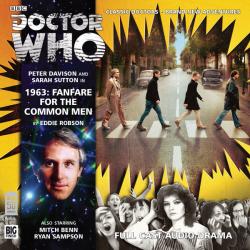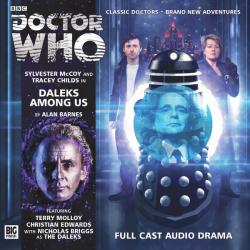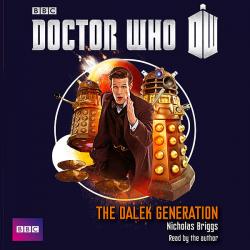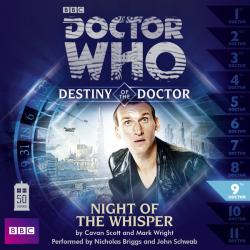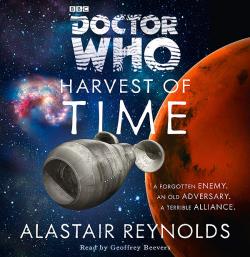Summer Falls (CD)
Wednesday, 23 October 2013 - Reviewed by
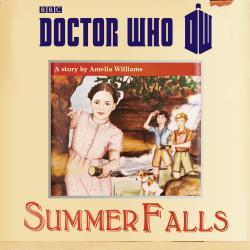
Summer Falls
Produced by AudioGo
Written by Amelia Pond (James Goss)
Read by Clare Corbett
Released: August 2013
“What chapter are you on?”
“Ten.”
“Eleven’s the best. You’ll cry your eyes out!”
“Ten.”
“Eleven’s the best. You’ll cry your eyes out!”
Clara Oswald and Artie Maitland, Doctor Who – The Bells of Saint John
Summer Falls is an oddity in Doctor Who’s expansive array of spin-off fiction – and not just because it is presented as an “in universe” book purportedly written by Amelia Williams in the 1950s (aka Amy Pond after her heartbreaking departure from the TARDIS). It is peculiar largely because while you would expect the story to be heavily influenced by Amy’s travels and adventures, it barely feels and reads like Doctor Who at all and is disappointingly small-scale in its breadth of imagination. And if this story is supposedly the same one that is referenced in the Doctor Who episode The Bells of Saint John, then I find it hard to believe it could ever have left an indelible mark on the lives of either Clara or the Maitland children!
The story by true author James Goss is homage to the works of Enid Blyton and CS Lewis, two legendary children’s authors who no doubt had some influence on his desire to write. The first half of the story is reminiscent of Blyton’s children’s mysteries such as The Famous Five, particularly as it focuses on a set of bored children in a country fishing village at the end of the school holidays. The second half very strongly evokes Lewis with its winter wonderland setting, vengeful spirits and talking animals – or more to the point, a talking grey cat. Even the wise and eccentric curator Barnabas channels Professor Digory Kirke in The Chronicles of Narnia as much as the Eleventh Doctor.
Goss handles this children’s tale faithfully but with little ambition or inventiveness. It would be interesting to invite a 10-year old or an adolescent to listen to this story to sum up their thoughts of it as a work in its own right (and not just as a very indirect Doctor Who tie-in) but to my mind Goss, at the bare minimum, recaptures many of the narrative devices that have made Lewis’ and Blyton’s works so enchanting to generations of readers. What he doesn’t do is perhaps drive home more of the actual Doctor Who connection for the fans – and let’s face it, who else is going to buy this release apart from Doctor Who fans?
Sure, there are some superficial similarities between the characters. The enigmatic curator is clearly based on the Doctor (albeit a much diluted, two-dimensional impersonation of the Time Lord’s eleventh incarnation!). The story’s juvenile heroine Kate Webster is modelled on young Amelia Pond herself. You could even put a case that Armand Dass could pass for a young Rory Williams. Perhaps young Kate’s mother, who is constantly having “naps” as an excuse to get out of real work, is loosely based on Amy’s aunt who was her only family after her parents were erased from the web of time. However, it is there that the similarities between the characters end. The story as a whole bears little resemblance to any of Amy and Rory’s adventures and experiences in the TV series. There are certainly no “Easter eggs” in this story that would appeal to the hard core Doctor Who fan, eg no allusions to Weeping Angels, Daleks or Silents. It really is just a generic, two-dimensional and run of the mill 1950s-style children’s fantasy adventure.
The audio reading of Summer Falls by Clare Corbett, however, does make the listening experience more enjoyable. I am not overly familiar with Ms Corbett’s CV (apart from a couple of readings of other Doctor Who and other AudioGO releases) but her narration is engaging and just the timbre of her voice is well suited to particularly the younger characters in Kate, Armand and Milo. She effortlessly changes the pitch of her voice between characters, from adults to children to the fantasy characters (her impression of the grey cat is my favourite!) – and vice versa. It really is as much a performance as a straight reading and Corbett acquits herself well.
But no matter how good a performer the narrator is, that will never disguise the intrinsic inadequacies of a story. As an “in universe” experiment, Summer Falls fails to appease the very audience it is directed at – Doctor Who fans who may have hoped to glean some insight into Amy Pond’s legacy. What they get is a fairly lame children’s story that is unlikely to be read by kids, unless of course they are themselves avid Doctor Who fans. (And again, as this audio book is being marketed under the Doctor Who logo, I cannot see it appealing to listeners who are not Doctor Who fans.) However, if you have young children of your own, Corbett’s entertaining rendition of the narrative may be enough to keep them entertained, if not exactly enthralled.
Which again begs the question: Why do Clara and Artie enjoy Summer Falls so much? Did it really enchant entire generations of children in the Whoniverse? And did Amy Pond really become the equal of Enid Blyton? Clearly, our real world version of Summer Falls is sadly not the same as the Whoniverse equivalent!
